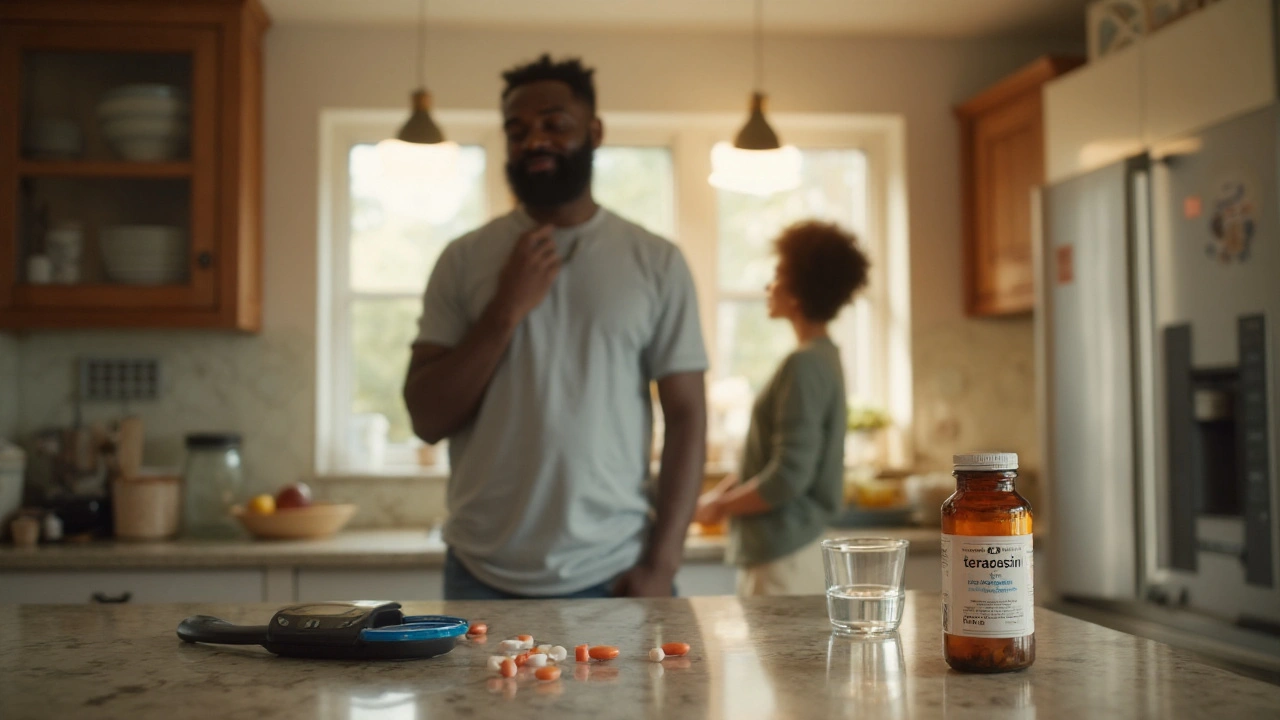Clear, people-first guidance on terazosin side effects in 2025: what’s common vs serious, red flags, interactions, and practical steps to prevent and manage issues.
BPH Medication Risks: What You Need to Know
Benign prostatic hyperplasia (BPH) makes the prostate bigger and can cause frequent trips to the bathroom. Most men turn to medication to shrink the gland or relax its muscles. While these drugs often help, they also come with side effects that can catch you off guard. Understanding the risks lets you spot problems early and talk to your doctor before they get serious.
Common BPH Drugs and Their Main Risks
Most prescriptions fall into three groups: alpha blockers, 5‑alpha‑reductase inhibitors, and PDE5 inhibitors. Alpha blockers (like tamsulosin or alfuzosin) quickly relax prostate muscles, easing urine flow. The trade‑off is a sudden drop in blood pressure, especially when you stand up. That can feel like dizziness, light‑headedness, or even a fainting spell.
5‑alpha‑reductase inhibitors (finasteride, dutasteride) shrink the prostate over months by blocking hormone conversion. They work well for long‑term control but may lower libido, cause erectile problems, or make you feel more emotional. Some men notice breast tenderness or a small amount of fluid in the breast tissue.
PDE5 inhibitors (such as tadalafil) are sometimes added for men who also have erectile dysfunction. They help with both symptoms, but they can still lower blood pressure and interact with nitroglycerin or other heart meds. Mixing these drugs with certain antibiotics or antifungals can raise their levels and increase side effects.
Other medicines, like anticholinergics (solifenacin, mirabegron) or combination pills, target bladder spasms. These can dry out your mouth, make you constipated, or cause blurry vision. If you already have glaucoma, anticholinergics might worsen it.
How to Manage and Reduce Side Effects
First, keep a daily log of any new symptoms—dizziness, changes in sex drive, breast changes, or mood swings. A simple notebook works better than trying to remember everything later. Bring that log to your next appointment so the doctor can see patterns.
If you feel light‑headed after standing, try getting up slowly. Sit on the edge of the bed for a minute before standing, and keep hydrated. Some doctors suggest a low‑dose alpha blocker first to see how you react before increasing the dose.
Sexual side effects are common, but they often improve after a few weeks. If they persist, ask about switching to a different class or adding a low‑dose PDE5 inhibitor that might balance things out. Never stop a medication abruptly; tapering can prevent rebound symptoms.
Check for drug interactions every time you start a new prescription, over‑the‑counter product, or supplement. Even herbal remedies like saw‑palmetto can affect hormone pathways and change how BPH meds work.
Routine blood tests are a good idea, especially with 5‑alpha‑reductase inhibitors. Your doctor will look at liver function, PSA levels, and hormone panels to catch issues early. If any test comes back abnormal, the doctor may adjust the dose or try a different drug.
Lastly, lifestyle tweaks—regular moderate exercise, a balanced diet low in caffeine and alcohol, and timed bathroom visits—can reduce reliance on medication. When meds are needed, combining them with healthy habits makes side effects less noticeable.
Bottom line: BPH drugs can improve quality of life, but they aren’t risk‑free. Stay aware of what your body is telling you, keep open communication with your doctor, and use simple tools like a symptom log to stay in control.
